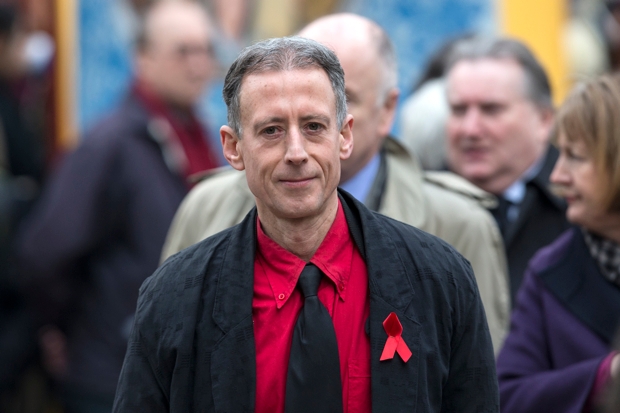Taking petulance to dizzy new heights, the LGBT officer of the National Union of Students has refused to share a platform with Peter Tatchell because she doesn’t like some of his views. Yes, the self-styled spokesperson for gay students is snubbing a man who has spent 40-odd years agitating for gay rights. Tatchell has been denounced, defamed and duffed-up in his struggle to give gay people a voice, and how do radical young gay people choose to use that voice? To bitch about him. To insult the man who helped secure their liberation. It’s ungratefulness of oceangoing proportions.
Fran Cowling, the NUS bureaucrat, pulled out of a panel debate with Tatchell on the basis that he is transphobic and racist. He isn’t, of course. These are simply the McCarthyite slurs of a cranky student leadership that polices language with cult-like vigour and refuses to tolerate anyone who doesn’t 100 percent subscribe to its weird worldview. Disagree with the NUS on trans stuff or Islam? You’re a bigot who must be No Platformed, a fancy phrase for cast out. As Tatchell says, the defamation of him as racist and transphobic speaks to the ‘witch-hunting, accusatory atmosphere’ that has taken hold on campuses.
Tatchell’s crime in the eyes of the student enforcers of correct moral thought is to have backed freedom of speech. He signed a letter that was published in the Observer a year ago today, which criticised the No Platforming of feminists who question the politics of transgenderism. It’s wrong to brand these people ‘transphobic’ and to treat them as moral reprobates, the letter said. And for signing the letter, Tatchell is now branded transphobic and treated as a moral reprobate.
That NUS officials will rage against and libel someone for defending ‘the basic principle of democratic political exchange’ tells you how scarily undemocratic and illiberal they have become, how far beyond repair their moral compasses are. Back free speech and they’ll seek to censor you. It’s Kafkaesque. Some say Tatchell hasn’t officially been No Platformed, and that’s true. But do not underestimate the chilling effect on freedom of speech of slurring someone as racist, or the censorious intent of leading NUS officials who refuse to rub shoulders with people who hold the ‘wrong views’. The aim of such cowardly, insidious behaviour is to paint certain individuals as moral wretches, beyond civilised engagement. And if even someone of Tatchell’s stature can be treated as a moral leper by NUS bigwigs, what hope do ordinary students who are ‘problematic’ have? They’ll have learnt an important lesson through the Tatchell scandal and other recent acts of intolerance: go against NUS diktat and you will be demonised, branded Islamophobic or transphobic or some other bad thing. And remember that in the 21st century such slurs live forever, online. What student will want to be known as prejudiced scum for the rest of his or her life? Better to stay schtum than risk being painted with a big red P for Phobic by the morality cops of the NUS. Yes, the Tatchell panel debate will go ahead — tonight, at Canterbury Christ Church University — but the LGBT officer’s censorious flounce will still have the chilling impact it is designed to have. The turn against Tatchell speaks to a worrying trend among today’s young radicals: fury with the very people who fought to make their lives freer and easier. At Cardiff University, feminist students tried to get Germaine Greer banned on the basis that she’s ‘transphobic’. At the University of Oregon, the student union seriously considered scrubbing Martin Luther King’s ‘I have a dream’ quote from the campus walls on the grounds that it focuses only on skin colour, and ‘diversity is so much more than race’. Radicals on other American campuses argue that MLK’s ‘colour-blindness’ — his dream of a nation where people would be judged by their character rather than their colour — negates people’s racial experiences. And now Tatchell, warrior for gay liberation, is snubbed by liberated gay people. This Veruca Salt-style revolt against late 20th-century liberators, this sullen, thankless turn by radical young women, gay people and black people against those who devoted their lives to fighting for women, gay people and black people, reveals how poisonous the politics of identity has become. Where late 20th-century warriors for civil rights basically argued for the right of people to be free and equal regardless of their gender, sexuality or race — that is, they wanted identity demoted — today’s identitarians prefer to obsess over people’s natural characteristics and sexual habits. They instinctively loathe King’s claim that character is more important than colour. They hate Greer’s insistence that women are as capable as men (and that a man can’t become a woman at the click of his fingers). They have disappeared so far up the fundament of identity politics that they bristle at any argument that smacks of universalism, which emphasises the sameness and the shared capacity for autonomy of all human beings. They seem hellbent on reversing the social gains of the late 20th century, preferring to shove people back into the biological, racial boxes from which mankind spent so long trying to escape. It is they, not Tatchell, who are racialist (if not racist), and a threat to what most of us consider to be the decent civilisational value of treating people as people rather than as colours or genders.





Comments